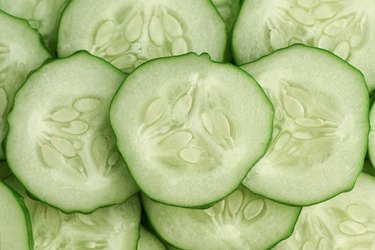
Cucumbers are extremely versatile. They're super in a salad, perk up plain water and come in English and Persian varieties. Better still, their benefits — including helping to keep blood pressure healthy — can stack up when you regularly eat these long green vegetables.
Cucumbers don't have any specific blood pressure-lowering powers, but like other vegetables, they have nutritional attributes that can help benefit your blood pressure numbers if combined with other healthy habits.
Video of the Day
Video of the Day
A Healthy Sodium-Potassium Balance
The USDA says that a medium, 7-inch-long cucumber contains 273 milligrams of potassium and just 4 milligrams (a tiny trace) of sodium.
These figures are relevant to your blood pressure because, according to the Centers for Disease Control and Prevention, reducing sodium and increasing potassium in your diet can help control high blood pressure and lower your risk for cardiovascular disease.
Most fresh vegetables are heart-healthy with little sodium and plenty of potassium, so cucumbers aren't particularly special in this respect. However, they do have the additional benefit of being very low in calories (with just 24 calories in a medium, 7-inch-long portion, according to the USDA).
"Eating plenty of low calorie but bulky fruits and vegetables — like cucumber — can fill you up and make it easier to manage your weight," says Vandana Sheth, RDN, CDE, a dietitian based in Torrance, California. "Losing even 10 pounds can reduce your blood pressure."
You should eat cucumbers fresh rather than pickled for maximum heart benefits, though. The added salt means one medium pickle can have 785 milligrams of sodium, according to the USDA.
Other Cucumber Benefits
USDA figures also show that cucumbers are 96.5 percent water, which means ounce-for-ounce they are nearly as thirst-quenching as water.
In addition, a medium portion has 14.5 micrograms of vitamin K, which is 16 percent of the daily recommended 90 micrograms amount for a woman and 12 percent of the 120 micrograms amount recommended for a man, according to figures from the National Institutes of Health Office of Dietary Supplements (ODS). Vitamin K is vital for healthy blood clotting and bones.
Cucumbers also supply some folate — a medium one has 28.1 micrograms, according to the USDA. That's about 7 percent of the daily 400-microgram recommendation for this vitamin, which can cause a type of anemia if you don't get enough, according to the ODS.
Despite some big claims, cucumber benefits don't extend to special detox properties. Some people favor drinking lemon and cucumber water every day, and you'll find any number of cucumber "cleanse" recipes on the internet. However, the Academy of Nutrition and Dietetics says your body comes equipped with its own detoxification system, and general healthy eating is all you need to support it.
More Blood-Pressure-Lowering Tips
As well as keeping an eye on your weight and eating vegetables and fruit, moderating your alcohol intake will help reduce your blood pressure.
According to the Mayo Clinic, drinking just one drink a day for women or up to two for men can potentially lower blood pressure a small amount. But that protective effect is soon lost if you drink too much, and more than moderate amounts of alcohol can raise blood pressure by several points.
A January 2018 study in the journal PLOS One found even binge-drinking just two to three times a month is a problem — increasing the chance of having high blood pressure by 70 percent.
Also, aim to eat fewer processed foods — only a small amount of sodium occurs naturally in whole foods, while most is added during processing, says the Mayo Clinic.
Trying to manage stress and keeping active are really helpful to help high blood pressure as well, the Mayo Clinic says. You should aim for 150 minutes of exercise a week, or about 30 minutes most days of the week. And keep it up, as your blood pressure can quickly rise again if you don't.
- Centers for Disease Control and Prevention “The Role of Potassium and Sodium in Your Diet”
- U.S. Department of Agriculture: “Cucumber, Raw”
- U.S. Department of Agriculture: “Cucumber Pickles, Sour”
- Vandana Sheth, RDN, CDE, registered dietitian, certified diabetes educator, Torrance, California
- National Institutes of Health Office of Dietary Supplements: “Vitamin K”
- National Institutes of Health, Office of Dietary Supplements: “Folate”
- Academy of Nutrition and Dietetics: “What’s the Deal With Detox Diets?”
- Mayo Clinic: “10 Ways to Control High Blood Pressure Without Medication”
- PLOS One: “Consumption of Alcohol and Blood Pressure: Results of the Elsa-Brasil Study”
Is this an emergency? If you are experiencing serious medical symptoms, please see the National Library of Medicine’s list of signs you need emergency medical attention or call 911.